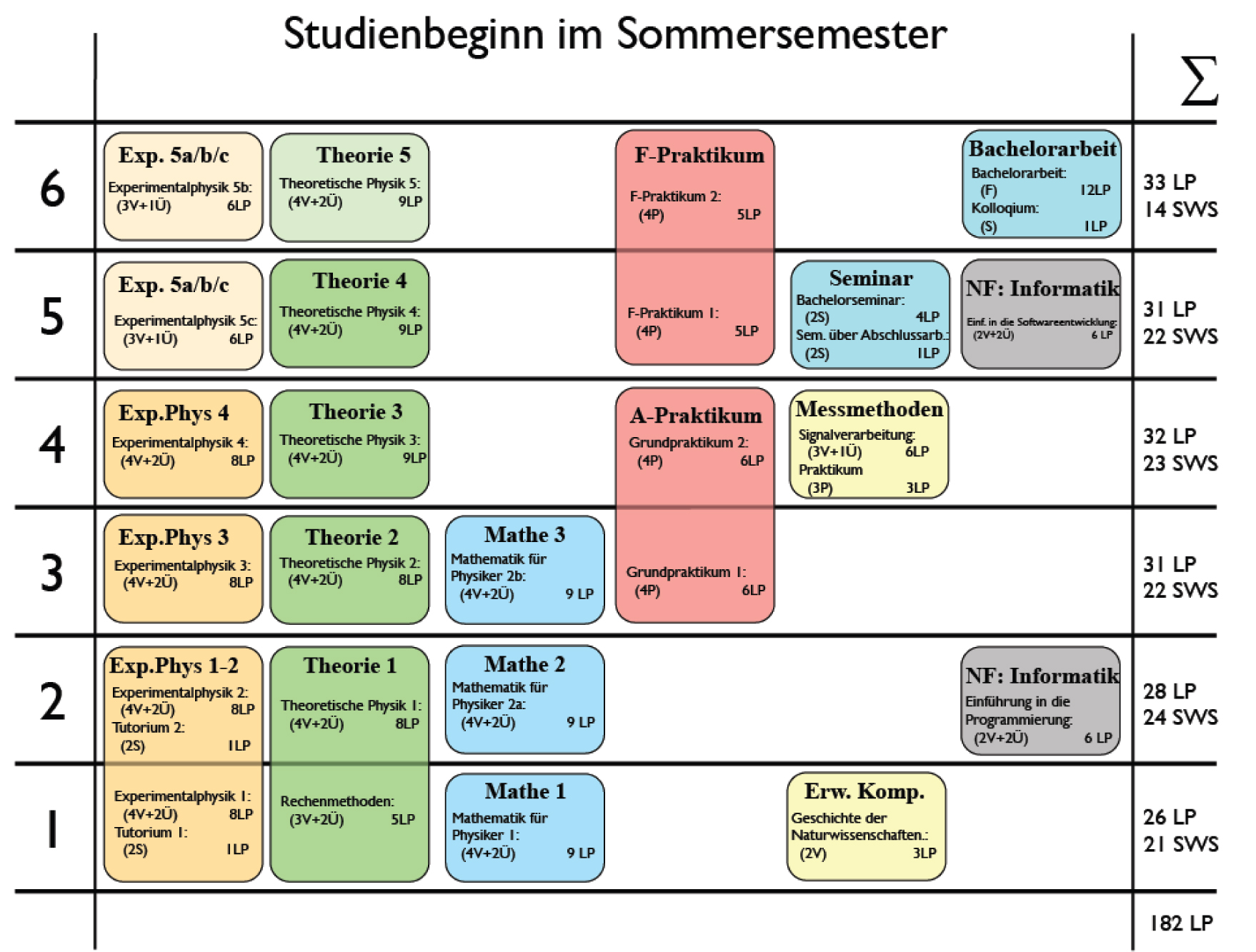A "Bachelor of Science in Physics" mainly provides a basis for the acquisition of a broad, research-orientated, general education in physics. For some areas of employment, a bachelor’s degree is all that you need. It also enables the graduate to change to other related fields of study. However, most of our physics students continue on to complete the Master’s program. The standard period of study, including writing the Bachelor’s thesis and taking final exams, amounts to three years (six semesters).
On this page we will give you all of the necessary information about this study program, including a study plan, a module handbook, and bylaws regulating the terms of studies and examinations. If you still have further questions, please contact the students’ councelor or the students’ office.
Program structure
The Bachelor of Science in Physics program is designed to be completed within a period of six semesters. Successful Bachelor’s graduates can subsequently enroll for a four semester Master’s program.
Both the Bachelor’s and Master’s programs in Physics aim for a thorough education in experimental, as well as theoretical physics. Consecutive lectures therefore provide a wide overview of the main areas of physics and the necessary mathematical and experimental methods. In tutorials held by postgraduate lecturers, beginning students are offered individual help. Tutorials and seminars leave enough room for discussions, encourage students to work independently within an academic environment and train the students’ rhetoric skills. During laboratory courses, the students become familiar with setting up experiments in a laboratory and practice using measuring instruments. From the fourth semester onwards, students can follow their individual scientific interests by supplementing the general lectures with appropriate in-depth lectures covering diverse fields of study.
Course of the program
The Bachelor’s program comprises a total of 180 credit points which corresponds to a duration of six semesters. Below you will find an example of a study plan (start in summer term and in winter term) that students may follow in the Bachelor of Science program:


Generic study plan for completing the Bachelor of Science in Physics program. 6 credit points need to be dropped. Only students who profited from an excellent education in Physics and Mathematics during their last high school years are recommended to take the basic laboratory courses during the first two semesters. Otherwise we recommend that you take these lab courses during the semester break (September/October) or that you replace the lab courses by a subject outside the field of physics, like chemistry or computer scien
Example of a study plan for completing the Bachelor of Science in Physics program, with the laboratory courses,in the third and fourth semesters and two classes covering fields other than physics in the first and the second semesters. Further information about the course of the program can be found in the module handbook, as well as in the study and examination regulations.
In the navigation bar on the right hand side you can find an overview of the required elective subjects outside the field of physics.
Module Handbook
In the navigation bar on the right hand side, you will find a downloadable PDF-version of the module handbook. It explains the content and course of the study program.
Information about the specific modules are also listed in the appendix of the study and examination regulations.
Study and Examination Regulations
In the navigation bar on the right hand side, you will find a downloadable PDF-version of the study and examination regulations, which apply to the Bachelor of Science in Physics program.
The document contains regulations and instructions regarding:
- the purpose and type of examinations (oral/written), as well as the subjects which require examinations,
- the basic requirements for a regular course of studies (standard period of study, number of classes and lectures, mandatory, required elective and optional courses etc.),
- admission requirements for specific examinations (proof of language skills, certificates of attendance, certificates of achievement etc.) as well as the appropriate application procedure,
- all deadlines regarding mid-term tests, final examinations, applications and repetitions of exams
- the requirements to apply for examinations, the duration of the exams, as well as the evaluation criteria and grades,
- criteria for passing or failing an examination as well as requirements for the repetition of examinations,
- report cards, documents and other credentials, as well as the academic degree.
Additionally, the bylaws contain many more specific, detailed guidelines, relevant for both examinations and general studies.
Furthermore you will find in the navigation bar on the right hand side a list of all required elective subjects outside the field of physics, which apply to the Bachelor of Science in Physics program.
